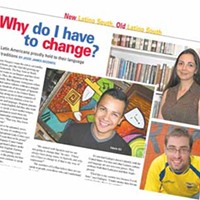Page 4 of 4
Ethnic isolation in newly christened barrios and sandlot soccer fields exacerbates the challenge of learning English.
"If I want, I don't need to speak in English here," says Marin, the Charlotte musician who learned English as a youngster in Ecuador. "My mother, she doesn't speak English, and she can do her life exactly the same as in Ecuador. At this point, you don't need it."
Across the "Nuevo South," public spaces like banks, hospitals, libraries and parking garages all accommodate Spanish-speakers. The Spanish language is doing what the Spanish themselves tried but failed to do. It is penetrating and settling in the South, 450 years removed from Fort San Juan. Spanish La Florida has renewed its drive up into the heart of Dixie. As Spanish and English collide once again in this region, there's little doubt the language of Shakespeare will continue to dominate, but Cervantes' tongue shows no signs of disappearing.
"I would say that it's very important to speak English, not in order to be an American, but I would encourage everyone in America to speak English and Spanish both," says Rev. Alex Gonzalez, a Colombian priest who arrived in coastal New Bern in 1997 without knowing a word of English. "I would say you have to speak Spanish, too, because most of the population in America speaks Spanish."
English may be the dominant language for nearly 400 million people who inhabit the US and Canada, but close to 700 million people live in Latin America, where Spanish and Portuguese rule. So the broader "America" is overwhelmingly Spanish speaking.
Still, social walls remain, even as geographic borders blur. In the past few years, Morganton has witnessed Ku Klux Klansmen march against immigrants, and the local newspaper reported on a cross-burning after which the perpetrator told police he was angry over plans to develop a trailer park where blacks and Hispanics might live. Other citizens are concerned with lost manufacturing jobs and the perception that Latinos are taking them. And they seem frightened by the language barrier.
Letty Cortes says both sides would gain from getting to know each others' languages better. "If we're in this country, then we should speak English, too, or try to learn it," she says. But she suggests US-born citizens should try to learn Spanish, too. "I really admire people who try to speak Spanish and try to understand my people coming to this country. It's so hard for us coming to this country where everything is new, language, people, culture. Sometimes we really feel very frustrated, too, because we want to communicate sometimes and we just can't. We don't find many people who are trying to understand us."
That seems to be changing, though slowly, as the image of Latinos as "outsiders" fades. Most immigrants say they feel more welcome today, even if they still reserve the term "American" for white or black natives of the United States. Rebeca Vasquez laughs at her elusive identity, coining the term "USA guys" to describer her English-speaking friends. As for musician Hermán Marin, his band La Rúa has found a warm welcome in Charlotte, where predominantly Anglo clubs like the Visulite Theatre, the Evening Muse and the Room have booked the group, and Anglo music lovers have begun to come and listen.
In restaurants from Morganton to Charlotte, the smell of hot corn tortillas mingles with the rhythms of traditional Latin American music styles such as cumbia, salsa, son and ranchera, as well as the chatter of waiters and waitresses speaking Spanish to their Hispanic customers and English to those USA guys. It's a huge change from the days when Latino and Anglo cultures in North Carolina looked at each other as if they lived in parallel worlds with glass walls — and from the days when the Spanish and English battled to determine America's cultural identity.
"We started to mix with each other since that time," says Marin, who cites English-language bands such as U2 and the Beatles as influences equally as important as Latin rock legends like Charly Garcia. "It's just a frontier that divides our world from yours, an imaginary frontier."
Jesse James DeConto is not a Spaghetti Western movie star. He is a free-lance writer and the great-grandson of Italian, Irish and German immigrants. You may contact him at jdeconto@thephillipsfoundation.org.





